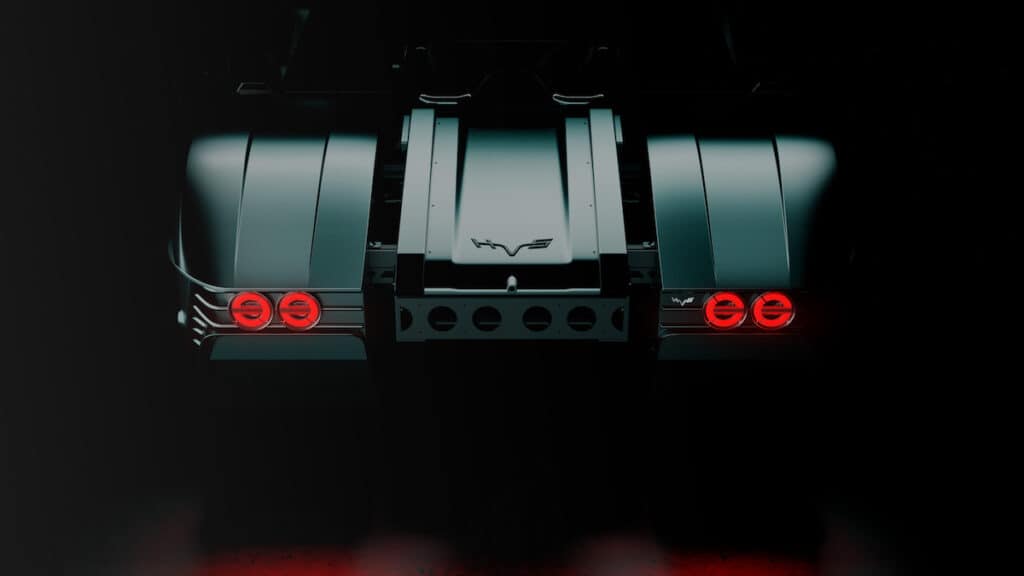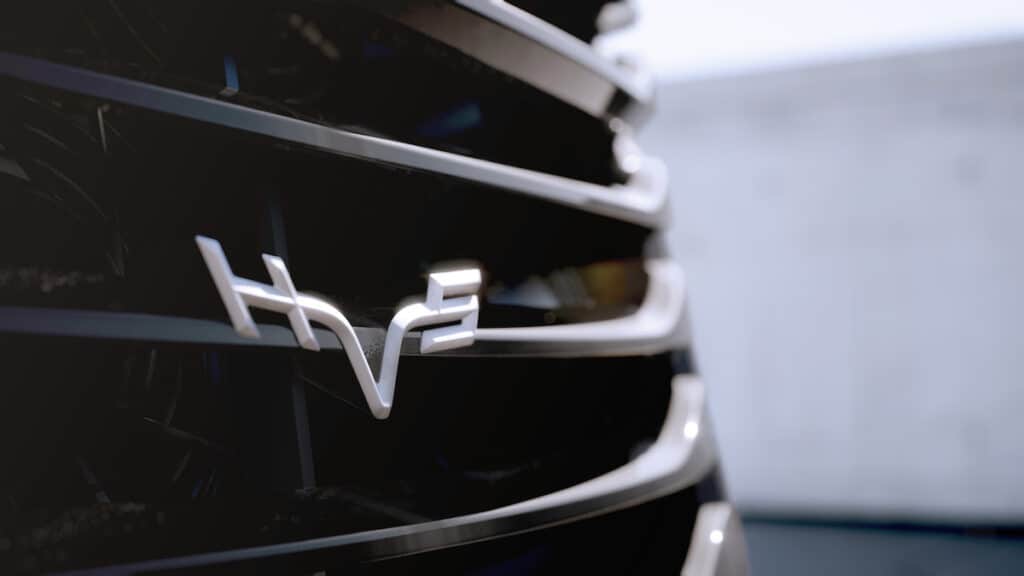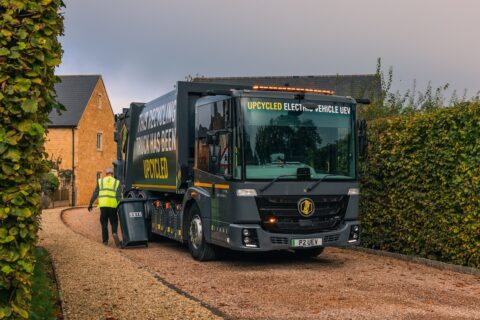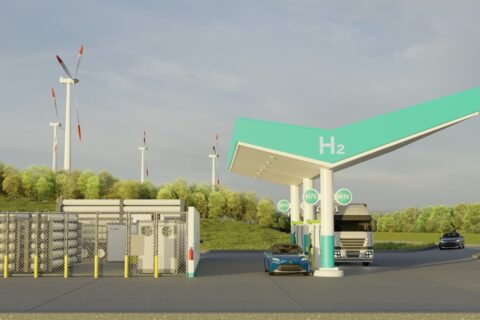
A new zero-emission hydrogen-electric heavy goods vehicle will launch officially this month in the UK with a range of up to 370 miles (600km), coupled with an industry-leading refuelling time of just 15-20 minutes.
The Heavy Goods Vehicle (HGV) from Hydrogen Vehicle Systems (HVS) will be the first indigenous UK-designed and developed hydrogen-electric HGV on the market.
Founded in 2017 and based in Glasgow, Scotland, HVS aims to disrupt the commercial vehicle industry by being an early mover with the most advanced, all–new zero-carbon-emission HGV.
Impact of HGVs on emissions
HGVs are the second largest contributors to UK transport emissions and have a disproportionate impact on the total. HGVs make up only 5% of total vehicle miles on the UK road network but contribute to around 18% of road transport CO2 emissions. As HGV transport miles and vehicle numbers continue to increase, so these figures are likely to increase, without the introduction of viable zero emission alternatives.
Based on conservative HVS sales projections to 2030, the new UK fleet of hydrogen HGVs, displacing diesel vehicles, could prevent more CO2 and air pollution than the reported annual emissions of Heathrow airport.
The business case for hydrogen-electric commercial vehicles is clear, says HVS CEO Jawad Khursheed:
“Thanks to the fresh thinking and ground-up approach, HVS has created an HGV that offers both game-changing technology and driver ergonomics. The state-of-the-art fuel-cell stack coupled with best-in-the-industry hydrogen tanks ensures rapid refuelling and maximises time on the road — delivering unrivalled total cost of ownership (TCO).”
State-of-the-art fuel cell stack
The HVS vehicle powertrain employs a fuel cell system and energy storage to deploy electricity to an electric motor to transmit power to the wheels. It uses a KERS (Kinetic Energy Recovery System) to recapture energy under braking and while the truck is slowing down.
The integrated powertrain is controlled with the HVS advanced control system SEMAS, which will deliver class-leading fuel efficiency and powertrain durability that contributes to achieving a TCO comparable to that of current diesel-powered offerings in the market.
The fuel cell permits longer range, higher load-carrying capacity, and faster refuelling than would be possible using battery-electric technology alone. The only emission from the vehicle in operation is water vapour, meaning there are no harmful greenhouse gas emissions of any kind.
Long range and quick fill-up
It is in the heavy-duty long-range HGV segment that hydrogen fuel cells offer the greatest advantages. Depending on payload, route travelled, road conditions and driving style – the HGV from HVS has the capacity to cover up to 370 miles (600km).
Hydrogen-powered vehicles do not need charging like a battery-electric vehicle. They are fuelled with hydrogen gas, stored at pressure in hydrogen cylinders. Refuelling takes a much shorter time than charging an equivalent battery vehicle and is comparable to filling a truck with diesel, at around 15-20 minutes to refill the hydrogen tanks.
Much of the initial hydrogen fuelling demand will be undertaken using mobile dispensers located close to demand at existing commercial vehicle gas stations. These mobile dispensers look very similar to conventional petrol and diesel ones, but with an approved hydrogen self-locking safety nozzle.
Green hydrogen is made using renewable electricity to split water (H2O) into hydrogen and oxygen. In the fuel cell, hydrogen recombines with oxygen from the air to produce heat, power and water.
Funding success for driverless and green

In February earlier this year, the Hub2Hub consortium lead by HVS was awarded £3.4M to develop and deliver a revolutionary, world-first, autonomous zero-emission HGV for the UK market.
The £12M venture was selected as one of seven grant recipients by the Centre for Connected Autonomous Vehicles (CCAV). Hub2Hub will create a self-driving heavy goods tractor unit, which will begin vehicles trials in 2024, with major UK retailer, ASDA.
This latest funding success follows on from the news in December 2022 that HVS has secured a £15M grant from the UK Government’s Advanced Propulsion Centre (APC), as part of a wider funding package to support zero emission transport.
The APC funding will support 50% of the total £30M cost of the HVS-lead consortium project, which is being run until June 2025. The consortium also includes Grayson Thermal Systems, Fusion Processing and PNDC, which is a commercial arm of Strathclyde University specialising in power electronics.
The new HGV from HVS will first be revealed at the Commercial Vehicle show on the 18th April, at the NEC in Birmingham, UK. HVS will showcase its gamechanging hydrogen powertrain in the form of a HGV Articulated Tractor Unit, Technology Demonstrator, fulfilling the company’s objective of being the first indigenous UK-designed and developed hydrogen-electric HGV on the market.
Further Reading:
- More about Hydrogen Vehicle Systems (HVS);
- More on the Centre for Connected Autonomous Vehicles (CCAV);
- More on the Advanced Propulsion Centre (APC);
- More about the UK Government’s Hydrogen Strategy;
- More facts and figures on heavy goods vehicles from the British Retail Consortium (BRC);
- Also on SustMeme, Net zero road transport is still possible by 2050;
- Also on SustMeme, World’s first hydrogen double-decker bus unveiled in Aberdeen;
- Also on SustMeme, First full-electric truck for inner-city logistics;
- Also on SustMeme, Hydrogen can clean up by 2050;
- Also on SustMeme, New centre to drive Circular Revolution in Wales (hydrogen car pioneer Riversimple);
- Also on SustMeme, Hydrogen: A rising balloon, or bursting bubble?
Check out full archive of stories on the SustMeme Transport & Mobility Channel, Sponsored by Global Mobility Call (GMC).






